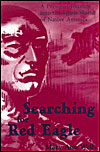 |
Searching for Red Eagle
A Personal Journey Into the Spirit World of Native America
Mary Ann Wells writes, "Before I had heard of George Washington, Abraham Linecoln, or even Jesus, I knew who William Weatherford was. He was Red Eagle, the icon implanted in my heart as an example of what a truly noble human being should be". An indirect descendant of Weatherford, Wells set out on a mystical journey to find him and her own identity. "If my path was true", she says, "I would know that hope can be reborn from deepest despair, and that, in the rebirth, each of us can choose who and what we will be". Weatherford was born c. 1775 to membership in his grandmother's Wind clan of the Alabama (Creek) tribe, the son of a mixed-blood mother and a prosperous Scots trader. Declared by his grandmother to have a special spiritual gift, he was sheltered from the Euro-American educational system and as a young man earned the name Red Eagle. Wells, born in south Mississippi to a family of Choctaw mixed-bloods, was made to feel different and unwelcome in mainstream society. In writing this book she sets forth to identify herself by a spiritual link with her kinsman and to understand his leadership in the Creek War of 1813-14. From exhaustive research and oral family stories she describes daily life and thinking among southeastern Indians in the Creek confederacy, and with her vivid insider perspective she recounts the historical facts. The cast of characters includes Andrew Jackson, Davy Crockett, Tecumseh, Seekaboo, and runaway slaves. Shifting between historical episodes and the present, Wells pursues the true story of Red Eagle. Her suspenseful prose gives a visceral sense of how Indians felt as victims of the American government and of how they had no recourse but to fight. Asher narrative progresses, Wells is transported in time and place, and alongside Weatherford she watches the Creek War unfold -- with traditional Indian values and morals caught in the maelstrom. She expresses first-hand anguish as the war plays out with devastating effects on native tri
256 pp — ©1998
|

